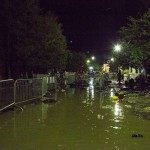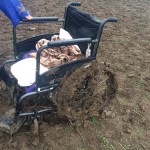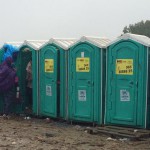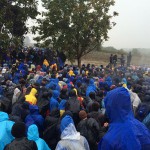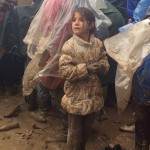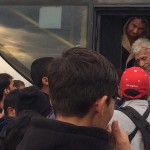The category of Border monitoring will be used to give reports about the flow of people throught the borders of the so called “Balkan route”. The route watch will mostly include borders and registration centers between Bulgaria, Macedonia, Serbia, Croatia, Hungary, Slovenia and Austria.
All information will be first-hand and forwarded from the groups of activists and volunteers (from sites such as Anti-Racist Front Without Borders from Slovenia, Open Borders Caravan that are located on the borders. The aim of the Border monitoring is not only to report on happening on mentioned borders and to give coordinates for the humanitarian aid, but also to make the recent flow of people (what the EU, its member states and mainstream media calls ‘refugee crisis’) a politically relevant question which adresses the discriminatory and xenophobic imigration and asylum policies within the EU, as well as its connection with the neoliberal developments. Open borders for all!
First post will outline the thoughts by some activists from the Anti-Racist Front Without Borders (Slovenia), who were in the past month present at the Slovenian, Macedonian, Serbian, Croatian and Hungarian borders.
Dramaturgy of safe corridor through the Balkans
At the moment borders and other points on the refugee route through the Balkans offer a quite different sight than the one from not a long time ago. Blocked borders, self-organized refugee camps at the train stations and around border crossings and occasional police violence gave way to the non-declared corridor of safe passage and for some time now reports about police violence remain practically absent. True, Hungarian governement due to the perceived needs of its domestic audience is still staging a show “heavily armed guardian od the Schengen border” and yet it is itself fully cooperating with the police forces of neighbouring countries in organising the transfer of thousands of people through the country. After initial disagreements between various Balkans’ states, non-coordinated responses and a certain degree of improvization – the latter was characteristic for Slovenia – European Union has by now managed to establish a unified and controled regime of management of people at practically the whole territory of the Balkans.
From afar, but also from up close, it seems at the moment that the agenda of refugees in fact overlaps with the agenda of the states that they are travelling through and of their police forces: people want to go to Europe which the respective states now do not only accept – they actively organize their journey through the Balkans. And yet this conclusion makes sense only if we focus exclusively on the fact that people indeed do move in an organized manner from point A to point B. But when the experience of refugees’ journey is taken into account in all its modalities it aquires a distinctly sinister character.
An ever present theme in the reports of activists that are present on the ground on the borders and in centres in Macedonia, through Serbia, Croatia and Hungary is a very sophisticated dramaturgy and scenography of the refugee journey through the Balkans: always there is a need to hurry; often the travelling is by night; there are never enough beds, never enough toilets; uncertainty reigns as there are never clear guarantees or information about whether the buses will be there or not; there is no opportunity to rest, think, share, talk; police lights pierce the sky and forests; all the rain and mud; mouldy bread; ban on warm food; power generators and warm beds for the police, damp covers for the rest; riot police uniforms reflections in the night; hurried night marches across the bridges and through the forests; barbed wire. All these images and body moves and affects fuel the continuous sensation of an assembly line. People do move to their desired destination and yet the possibility to really influence the dynamics of their journey is taken away from them. This dehumanization is complemented by the perverse command of thankfulness which the refugees are obliged to feel in relation to the bureaucrats that are masterminding a regime of their hierarchical inclusion in our communities.
Enough has been said about the deeply problematic role of humanitarian organizations on the ground that in many locations have hardly been doing much more besides just being there. Throughout the Balkans the important humanitarian efforts are being organized by self-organized volunteers from all corners of Europe. But what more could be the role of the activists, that is to say of those that find themselves in this situation not as refugees but as all those other people that are striken by processes of capitalist devastaton in a very personal way and are dedicated to practically organise solidarity wih our new neighours and colleagues?
How can we prevent that the journey of refugees to Europe would end in their separation from the society and in imposed weakness that comes with it? How can a journey of refugees to Europe end up increasing thepower of the refugees themselves and of all of us that are their supporters and not in further boosting of the power of border agencies and population management bureaucracy? This is a challenge that many people from open borders caravans , volunteers at the borders and elsewhere are faced with today.
As we reflect on the already relatively consolidated situation across the Balkans we can already recognize the contours of a new regime that will be unveiled in its fullness at the moment when now open borders will be shut down. Then we wil be left with increasingly militarized outside border of European union and a consolidation of some form of buffer-zone in the territories of Serbia, Macedonia and maybe Croatia, Hungary and – why not – Slovenia. And with tens of thousands of “stranded foreigners” within this zone. Thus a new phase of crisis of Europe will be inaugurated that will further fertilize already fertile ground for the spread of ideas of hate and agression.
This is why it is a task of an utmost importance to construct naratives that will enable us, the precarious, unemployed, poor, youth without future, potential emigrants, us that are on so many different levels ourselves already targets of terror of capitalist devastation, to build together with the refugees the political, discursive and physical spaces of resistance against the same terror. Together. Brake down the borders, build the power.
(source: http://komunal.org/teksti/271-zlovesca-dramaturgija-balkanske-poti)
Preševo (Macedonian-Serbian border) this Saturday (10.10.2015) updated (18.10.2015)
Article about happening at Preševo – http://gauge-mag.com/reports/presevo-this-shouldnt-be-our-job/#jp-carousel-675
Useful Links:
Refugee Help Map (Border monitoring, where the help is most needed. Useful information: activists are the most needed during weekdays) – https://www.google.com/maps/d/viewer?mid=zddfRUtGScOc.kQBgTQcoV5FM&hl=en_US
